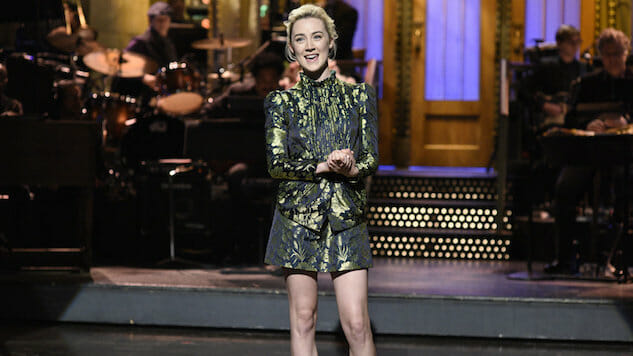Saturday Night Live: “Saoirse Ronan / U2”
Images via NBC
One more slog of a Saturday Night Live episode down, too many more to go. Host Saoirse Ronan performed admirably, sometimes even enjoyably in an evening of impressive mediocrity. There was a solid enough digital short; Pete Davidson did his Pete Davidson thing in a recurring sketch whose last installment was what, three episodes ago?; and Michael Che made yet another bad, revealing joke about sexual harassment. All in all it was a joyless ninety minutes, even the bit where a bunch of dogs ran out from backstage, even the theoretically catchy and anthemic music video, even the part of Weekend Update where Che made fun of Colin Jost. What else is new?
The cold open quickly laid the groundwork for what awaited us. Alec Baldwin returned as Donald Trump for a Christmas Carol parody in which he was visited by a sequence of ghosts: Michael Flynn (Mikey Day) as Marley’s ghost, Billy Bush (Alex Moffat) as the Ghost of Christmas Past, Vladimir Putin (Beck Bennett) as the Ghost of Christmas Present and Hillary Clinton (Kate McKinnon) as the Ghost of Christmas Future. Baldwin’s Trump impression is worse than ever, not that it’s ever been all that good, having basically reduced itself to a perpetual pout and a weird low voice that doesn’t sound like Trump at all. Congratulations to Kate McKinnon on her quick change, I suppose—she appeared in the beginning of the sketch as Kellyanne Conway—but man, how grating to see SNL whip out Clinton to chant “Lock him up!” The sketch epitomized the show’s toothlessness: It said nothing new or interesting about Donald Trump other than “he’s doomed,” which certainly isn’t as true as it would have to be to merit laughter here. SNL has a bad habit of focalizing the Trump Administration’s dangers in Trump himself, as opposed to the institutions enabling him—the GOP, capitalism, the patriarchy, American oligarchy, the military industrial complex, one could go one for a while. It’s wish fulfillment, and worse, the sort of wish fulfillment that encourages complacency: if you simply acknowledge that Trump sucks, well, you’ve done your part. It makes for easy satire but not good satire, and certainly not satire that feels fresh one year in.
All right, some good stuff before the rest of the bad stuff. Lady Bird star Saoirse Ronan felt right at home in the ensemble, moving gamely from sketch to sketch and character to character with not a flicker of hesitation. She mostly assumed supporting roles in ensemble-driven pieces, such as the Jersey Shore parody “Floribama Shore,” which seemed to be one long joke about dumb rednecks, and “Return Counter,” where she dunked on Chris Redd at the beginning and then disappeared. If she had a standout sketch, it was probably the digital short “The Race,” though mostly because that was the episode’s standout. She played a kindhearted office worker who encouraged her downcast colleague (an understated Kyle Mooney) to challenge his bully to a race. She coached him in what seemed like it would become a classic training montage, then wisely ended after a single beat. Then, after he won the race, she disappeared; a puppet popped into the frame and announced that she was a ghost. It was a long, patient sketch with surprising fantastical elements and a compelling emotional through-line, succeeding more in its diversion from SNL’s norm than in any single performance, though all were good.
Ronan’s monologue was less successful. Remember, oh, two months ago, when Gal Gadot hosted, and the running joke of the monologue was that people think she’s actually Wonder Woman? Last night the running joke was that nobody knows how to pronounce “Saoirse,” because it’s just so hard for the sequence of players who run onstage—Leslie Jones, Kate McKinnon, Bennett—to figure it out, even after she says exactly how. As with the Gadot bit, this one was frustratingly lazy. The writers identified a single, superficial characteristic of their host and beat it well beyond death. Is it really so hard to, I don’t know, use the monologue to say something about anything that’s happening in the world? Other late night shows manage to do it several consecutive nights each week. When SNL follows yet another installment of “Trump Is Bad (ft. Alec Baldwin)” with a monologue that doesn’t even try to look outward, the overall feeling is that the show has no interest in being relevant.